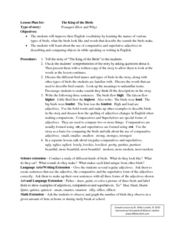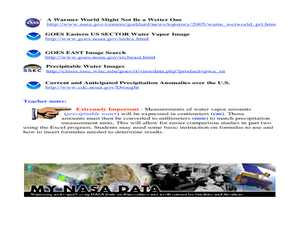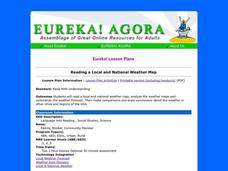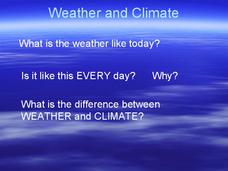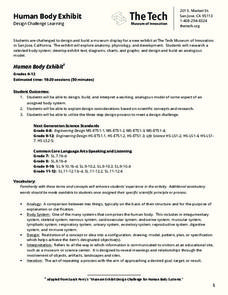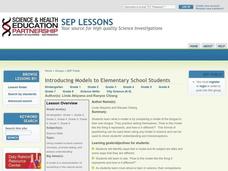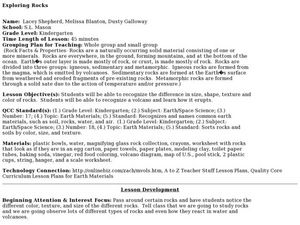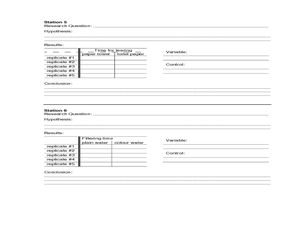Curated OER
The King of the Birds vocabulary
Science and language skills come together in The King of the Birds. After reading, discuss the names and types of birds in the story and write given sentences to portray the difference between comparative and superlative adjectives....
Curated OER
Guess Who? Coral
Fourth graders identify and group coral formations. In this coral identification lesson, 4th graders examine coral pictures, discuss vocabulary, and provide similarities and differences in the growth formations.
Curated OER
Holey Story
Sixth graders create a cloze activity based on an article of a current event. They switch worksheets and the next group chooses the words they feel are missing and justify their word choices.
Curated OER
A Comparison Study of Water Vapor Data to Precipitation over North America
Students use NASA satellite data to compare water vapor over the United States. In this data analysis lesson students use an Excel spreadsheet to map their data.
NOAA
Mud is Mud...or is it?
We know that the type of soil varies by location, but does the seafloor sediment also vary, or is it all the same? Scholars compare photos of the seafloor from two different locations: the Savannah Scarp and the Charleston Bump. Through...
Curated OER
Reading a Local and National Weather Map
Students examine weather maps. They examine icons and map symbols. Students explore vocabulary words related to weather. Students analyze and evaluate information provided on the weather map.
Curated OER
Weather and Climate
It's hot today, but is that the weather or the climate? This colorful presentation isolates both concepts to allow for better understanding by covering the positioning of the planet, making comparisons of land versus water, and looking...
Curated OER
4.2: Exploring Rocks
Students collect and look at rocks and write down information about them in science notebooks. They make comparisons and sort the rocks according to their properties, and then discuss their findings with their classmates and put them on...
Curated OER
Pond Theme Unit
In this pond theme activity students research facts on pond life. Students complete comprehension questions, crosswords, word search, and math puzzles. Students write a short report.
Curated OER
Wetland Food Webs
Young scholars study life science. In this food webs and food chains comparison lesson, students examine the wetlands to discover the relationships that exist between the animals that live there. They participate in group activities and...
Curated OER
“THE LORAX” by Dr. Seuss
Few children's books convey the message of conservation as well as Dr. Seuss' The Lorax. Read the story aloud, emphasizing the interconnectedness of plants and animals in an ecosystem and discussing different ways people can help...
Curated OER
Describing the Physical World
In this physical world worksheet, learners review concepts relating to the chemical and physical properties of matter, density of matter, and if matter is a solid, liquid, or gas. This worksheet has 9 terms in a word puzzle, 4 true or...
Tech Museum of Innovation
Human Body Exhibit
Explore human anatomy and physiology using models. Scholars study systems of the human body and design a display for a museum exhibit. To complete the activity, individuals create analogous models of their chosen human body systems.
Curated OER
Making It Balance
Students listen to story, "The 100-Pound Problem," compare their weight with character in story, and weigh different classroom items using nonstandard units and standard units. They experiment with different items that can make scale...
Curated OER
A New Phase In Town
Middle schoolers explore heat energy and how it is used to change the phase of matter, and discover that temperature does not increase or decrease until the phase change is complete. This extremely well-written plan is packed with great...
Curated OER
Introducing Models to Elementary School Students
Students explore the concept of models. In this model lesson, students examine 3-dimensional models of various objects and body parts to better understand the natural world.
Curated OER
Exploring Rocks
Students collect and examine rocks. They record information about the rocks they have collected in their notebooks. They compare and contrast different rocks and complete a class chart at the end of the lesson.
Curated OER
Food Chains
Fourth graders study food chains, producers, consumers, and decomposers. They play a food chain game and create food chain mobiles or posters. They take a nature hike around the school and observe various parts of a food chain.
Curated OER
Ants
Third graders study the habits and habitats of ants. They research the use of technology as a valuable investigation tool and access other web sites for future research projects. The students make successful decisions while playing SimAnt.
Curated OER
Introducing Models to Elementary School Students
Students explore the concept of creating models. In this model representation lesson plan, students are introduced to the idea of a model and discuss the differences between models and the actual object.
Curated OER
The Scientists’ Way
Students summarize the steps of the scientific method. In this life science lesson, students explain the importance of varying only one variable at a time. They analyze possible flaws in their experiment.
Curated OER
What Happens When A Cell Divides?
Students investigate the cycle of mitosis. In this biology lesson, students discuss the different stages of mitosis through cell reproduction. They further their investigation through laboratory analysis.
Curated OER
Termite Biology
Young scholars explore the physical characteristics, distribution and habitat of termites. The lesson focuses on the termite as a social creature contrary to most other insects.
Curated OER
Critters in the Classroom
Students investigate with sea urchins. In this ocean habitat lesson, students observe sea urchins and other ocean grazers. Students work with lab equipment to examine the anatomy of these creatures.
